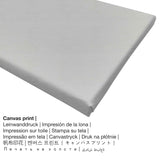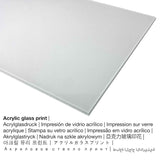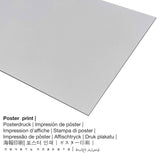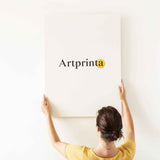Jacques Blanchard, 1630 - Angelica and Medoro - fine art print
Tax included. Shipping calculated at checkout.
Summary of the replica
This 17th century artwork titled Angelica and Medoro was painted by the baroque painter Jacques Blanchard. The painting was made with the absolute size - With added strip at top 47 7/8 x 69 1/4 in (121,6 x 175,9 cm) and was manufactured with the technique of oil on canvas. Today, the artpiece is in the the The Metropolitan Museum of Art's digital art collection, which is one of the world's largest and finest art museums, which includes more than two million works of art spanning five thousand years of world culture, from prehistory to the present and from every part of the globe.. With courtesy of The Metropolitan Museum of Art, New York, Gift of George A. Hearn, 1906 (public domain). Additionally, the artpiece has the creditline: Gift of George A. Hearn, 1906. In addition to this, the alignment is landscape with a side ratio of 1.4 : 1, which implies that the length is 40% longer than the width. Jacques Blanchard was a male painter from France, whose artistic style was mainly Baroque. The European painter was born in the year 1600 in Paris, Ile-de-France, France and passed away at the age of 38 in the year 1638.
Choose a material option
For every product we offer different sizes and materials. We allow yout to choose among the following variants:
- Printed poster (canvas material): The poster is a UV printed canvas with a slightly roughened structure on the surface. Please note, that depending on the size of the poster we add a white margin of around 2-6 cm round about the painting, which facilitates the framing with your custom frame.
- Canvas print: A printed canvas, not to be mistaken with a canvas painting, is a digital copy applied on a canvas. What is more, canvas makes a cosy and pleasant atmosphere. Canvas prints are relatively low in weight, which means that it is easy and straightforward to hang the Canvas print without the support of any wall-mounts. A canvas print is suitable for all types of walls.
- Metal print (aluminium dibond): Aluminium Dibond prints are metal prints with an outstanding depth. Its non-reflective surface make a fashionable look. A direct Aluminium Dibond Print is the ideal introduction to fine reproductions manufactured with aluminum. For your Print On Aluminum Dibond, we print the favorite artwork on the aluminium composite surface. The bright parts of the original artwork shine with a silky gloss, however without any glow. The colors of the print are luminous and bright in the highest definition, the fine details appear clear and crisp. This direct print on aluminium is one of the most demanded entry-level products and is an extremely stylish way to display artworks, as it puts the viewer’s attention on the artwork.
- Acrylic glass print: An acrylic glass print, which is sometimes named as a UV print on plexiglass, will change the original work of art into beautiful wall décor. Above all, it makes a good alternative option to aluminium and canvas prints. The work of art is being custom-made with modern UV print technology. The acrylic glass protects your selected fine art print against light and external influences for many years to come.
Legal disclaimer: We try our best in order to depict the products in as much detail as possible and to illustrate them visually. Nonetheless, the tone of the printing material, as well as the print result can diverge to a certain extent from the representation on the device's monitor. Depending on the settings of your screen and the nature of the surface, not all colors are printed as realistically as the digital version. Given that our fine art prints are printed and processed by hand, there may also be slight differences in the motif's exact position and the size.
Product specs
| Product categorization: | art reproduction |
| Reproduction method: | reproduction in digital format |
| Manufaturing technique: | digital printing |
| Provenance: | made in Germany |
| Type of stock: | on demand |
| Product use: | home décor, wall gallery |
| Alignment: | landscape alignment |
| Aspect ratio: | 1.4 : 1 (length : width) |
| Image ratio meaning: | the length is 40% longer than the width |
| Materials you can choose from: | poster print (canvas paper), metal print (aluminium dibond), canvas print, acrylic glass print (with real glass coating) |
| Canvas print (canvas on stretcher frame) size variants: | 70x50cm - 28x20", 140x100cm - 55x39" |
| Acrylic glass print (with real glass coating): | 70x50cm - 28x20", 140x100cm - 55x39" |
| Poster print (canvas paper) options: | 70x50cm - 28x20" |
| Aluminium print sizes: | 70x50cm - 28x20", 140x100cm - 55x39" |
| Frame: | please bear in mind that this art print has no frame |
Background information on the unique artpiece
| Name of the painting: | "Angelica and Medoro" |
| Artwork classification: | painting |
| General term: | classic art |
| Period: | 17th century |
| Year of creation: | 1630 |
| Age of artwork: | more than 390 years |
| Original medium of artwork: | oil on canvas |
| Original artwork dimensions: | With added strip at top 47 7/8 x 69 1/4 in (121,6 x 175,9 cm) |
| Exhibited in: | The Metropolitan Museum of Art |
| Location of the museum: | New York City, New York, United States of America |
| Web URL: | The Metropolitan Museum of Art |
| License type: | public domain |
| Courtesy of: | The Metropolitan Museum of Art, New York, Gift of George A. Hearn, 1906 |
| Creditline: | Gift of George A. Hearn, 1906 |
Structured artist data
| Name: | Jacques Blanchard |
| Aliases: | Blanchard Jacques I, Jacques Blanchart, Jaques Blanchard, Monsr. Blanchart, M. Blanchard, Sr. Blanchard, Jacques Blanchard, J. Blanchard, Jacques I Blanchard, Blanchart, Monsieur Blanchart, Blanchard Jacques, Mr. Blanchart |
| Artist gender: | male |
| Artist nationality: | French |
| Professions: | painter |
| Country of the artist: | France |
| Artist classification: | old master |
| Styles of the artist: | Baroque |
| Died aged: | 38 years |
| Year of birth: | 1600 |
| Birthplace: | Paris, Ile-de-France, France |
| Year of death: | 1638 |
| Died in (place): | Paris, Ile-de-France, France |
This text is copyrighted ©, Artprinta.com (Artprinta)
Additional description by the museum (© - The Metropolitan Museum of Art - www.metmuseum.org)
The canvas illustrates a passage from Ludovico Ariosto's (1474–1533) epic poem Orlando Furioso (XIX:36), in which the two lovers engrave their names in the bark of a tree. Because the surface is worn, the letters are no longer visible. In the early 1630s Blanchard was decorating the galleries of various private houses in Paris with such narrative pictures in series. The soft lighting and languid nudity suggest the influence of sixteenth-century Venetian painting.














